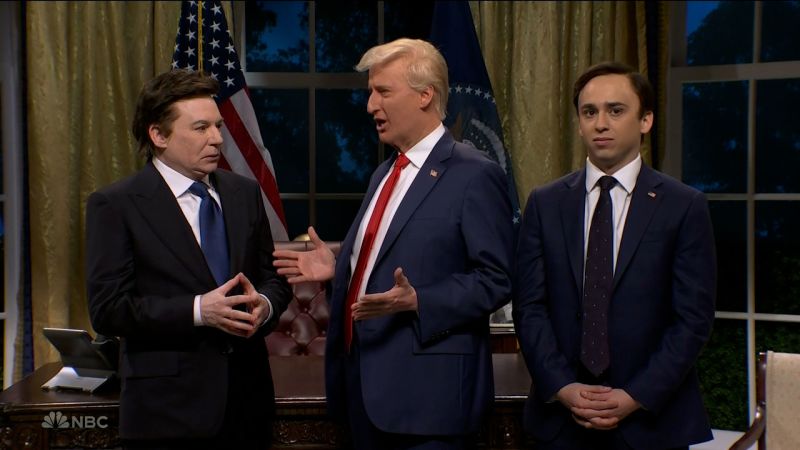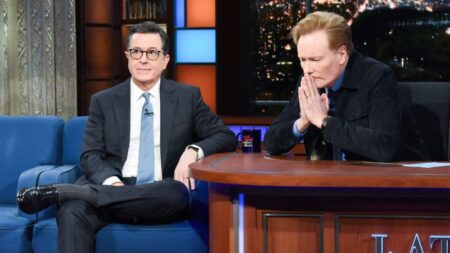“Saturday Night Live,” the beloved sketch comedy show, made its grand return to the Oval Office in this week’s cold open. The segment depicted a fictional meeting amongst notable figures, including President Donald Trump, portrayed by James Austin Johnson, Secretary of State Marco Rubio, played by Marcello Hernandez, and the tech entrepreneur Elon Musk, brought back to life by Mike Myers. The show cleverly employed a “Curb Your Enthusiasm”-style narrative that allowed viewers to hear the characters’ inner thoughts, adding a humorous twist to the interactions.
This particular sketch opened the much-anticipated episode hosted by the pop sensation Lady Gaga. The comedic choice to feature these public figures in a satirical light allowed “SNL” to delve into contemporary political discourse. The premise revolved around tension between Rubio and Musk, which was being mediated by Trump. Notably, recent reports have indicated that members of Trump’s Cabinet, including Rubio, had been growing uneasy with some of Musk’s actions, particularly concerning the Department of Government Efficiency.
One particularly amusing exchange occurred when Hernandez’s Rubio, attempting to assert himself, mentioned his behind-the-scenes efforts to negotiate a deal with the Panamanian government to regain control of the Panama Canal. The humor escalated when Trump’s character nonchalantly dismissed the significance of the Canal, expressing indifference by stating, “Eh, I don’t want it anymore. You know, (it) seems like a hassle. What I really love is Thailand. Okay? Because I’ve been watching ‘White Lotus’ and it looks beautiful.” This choice of dialogue humorously reflects the often whimsical disregard that public figures exhibit towards serious matters.
As the sketch continued, it provided ample reflections of Trump’s thought process. Johnson’s Trump mentally criticized Rubio’s lengthy speeches, indicating boredom with his colleague’s discourse. At one point, he pondered, “Ah, so boring. This guy can’t stop talking.” This inner dialogue brought an intriguing layer to the sketch, showcasing how even a character as boisterous as Trump could find aspects of political discussions tiresome. He later thought, “I should do this more often,” recognizing the absurdity of sharing his thoughts in such a manner while humorously dismissing the idea of actually doing it again.
Meanwhile, Musk’s character, portrayed by Myers, was also given the opportunity for introspection. At one juncture, Musk contemplated whether taking the job was a mistake, turning the sketch into a commentary on personal insecurities in high-profile jobs. The character mused about being widely disliked, remarking, “A lot of people seem to really hate me. My Tesla stock is crashing and my personal net worth just dropped by $100 billion dollars.” Myers concluded this line with a signature flourish reminiscent of his iconic Dr. Evil character from the Austin Powers franchise, injecting a nostalgic element into the sketch.
The episode represents a significant milestone as “SNL” is currently celebrating its 50th season. This remarkable anniversary was marked recently with a star-studded special that encapsulated the show’s extensive history and cultural impact. The return to political satire in such a meaningful and humorous way contributes to the ongoing narrative of how television, particularly sketch comedy, can engage with contemporary events and figures while also providing commentary and entertainment.
In conclusion, this particular “SNL” sketch not only entertained its audience but also served as a reflection of the complexities encountered in the political landscape. With its sharp humor and clever characterization, it reminded viewers of the show’s ability to mix satire with relevant real-world issues, a hallmark of its enduring legacy in American pop culture. The humorous dynamics and interactions amongst Trump, Rubio, and Musk poignantly illustrate the oftentimes chaotic nature of political alliances and public perception.











